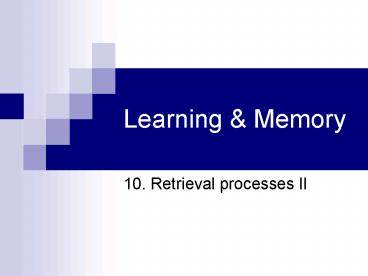Learning PowerPoint PPT Presentation
1 / 19
Title: Learning
1
Learning Memory
- 10. Retrieval processes II
2
Retrieval processes II
Essential (also for lecture 9) a) Baddeley,
ch. 11, b) Eysenck Keane, ch. 6 c) Anderson,
ch. 7, d) Blaxton 1989 e) Jacoby 1991
Implicit explicit Amnesia
Implicit explicit Normals
Automatic False fame
Retrieval processes I
Process dissociation procedure
Feeling of Knowing
Tip of the tongue
Before
After
During
3
Multiple retrieval processes
- Last week
- Episodic vs. semantic?
- Data-driven vs. conceptually-driven retrieval
- This week
- Implicit vs. explicit retrieval
- Note The lack of evidence for implicit learning
(Lecture 1) does not preclude implicit retrieval
of explicitly learned information. - Recollection vs. familiarity.
4
Evidence from amnesia
P L I _ _ _ _
ORANGE
Warrington Weiskrantz (1970)
5
Evidence from normals
A _ _ A _ _ I N C _ A R _ T _ H _ O _ R E M _ Y S
_ _ R Y
Tulving, Schacter Stark (1982)
6
False fame effect
- Study
- Read non-famous names aloud (e.g. Sebastian
Weisdorf) - Full attention
- Divided attention(digit detection)
- Test
- Fame judgements
- Old, non-famous (e.g. Sebastian Weisdorf)
- New, non-famous(e.g. Avril Zwickel)
- Famous(e.g. Christopher Wren)
Jacoby, Woloshyn, Kelley (1989)
7
Retrieval routes
- Intentional
- Effortful
- Automatic
- Familiarity-based
8
Naïve empiricism
- Intentional or explicit tests
- Recall, recognition
- Automatic or implicit tests
- Fragmented words, fragment completion, fame
judgements.
9
Process dissociation
- Intentional process
- Automatic process
- Typically, both contribute to successful
retrieval - Stronger claim Both contribute, but the
contributions are independent.
Jacoby (1991)
10
Process dissociation procedure
- Read a list of words List 1
- Hear a list of words List 2
- Two retrieval tests
- Both tests include List 1, List 2 and novel
words. - Inclusion test Respond old if word was on
either list. - Exclusion test Respond old only if word was on
List 2.
11
Inclusion test
- Inclusion test Respond old if word was on
either list. - Intentional (recollective) process will have a
certain probability of concluding old for List
1 words R - Automatic process will also have a certain
probability of concluding old for List 1 words
A - If either process concludes old, the subject
will respond old - P(old) R A RA (Laws of probability)
12
Exclusion test
- Exclusion test Respond old only if word was on
List 2. - Subject will only respond old to List 1 words
if two things happen - The automatic process responds old due to a
feeling of familiarity A - The intentional process fails to recognise the
word (if it had, it would recall it was from List
1) (1-R)
P(old ) A(1-R)
13
Dissociating the processes
- Inclusion P(old) R A RA
- Exclusion P(old) A(1-R)
- Inclusion Exclusion
- ( R A RA ) A (1 R)
- R A RA A RA
- R
- A Exclusion / (1-R)
14
Process dissociation Evidence
- Read a list of words List 1
- Hear a list of words List 2
- Two retrieval tests
- Inclusion test P(old) 0.48
- Exclusion test P(old) 0.37
- R Inclusion Exclusion 0.11
- A Exclusion / (1-R) 0.37 / 0.89 0.42
- Intentional process should be eliminated by
divided attention (digit task) R 0. - Exclusion A(1-R) 0.42 (1-0) 0.42
- Actual data 0.43
Jacoby (1991)
15
Interim summary
- R retrieval
- Retrieval is explicit
- Intentional
- Effortful
- Retrieval is conceptually-driven
- Retrieves episodic information
- Highly contextual
- Interference-prone (e.g. effect of delay).
16
Interim summary
- A retrieval
- Retrieval is implicit
- Relatively automatic
- Relatively effortless.
- Retrieval is data-driven
- Retrieval can be based of a feeling of
familiarity. - Retrieves semantic information
- Relatively non-contextual
- Relatively robust to interference (e.g. effect of
delay).
17
Feeling of knowing
- Which planet is the largest in our solar system?
- What sea does West Pakistan border?
- If fail to answer, rate Feeling of Knowing (FoK)
as ability to pick correct answer from several
alternatives. - Then do this recognition test.
Hart (1965)
18
Tip of the tongue phenomenon
- Definition a navigational instrument used in
measuring angular distances, especially the
altitude of the sun, moon, and stars at sea - Whats the word?
- ToT state strong FoK, without retrieval
- Number of syllables
- Two.
- 60 correct
- First letter
- S
- 50 correct
- Retrieval is not all or none.
Brown McNeil (1966)
19
What next?
Essential (also for lecture 9) a) Baddeley,
ch. 11, b) Eysenck Keane, ch. 6 c) Anderson,
ch. 7, d) Blaxton 1989 e) Jacoby 1991
Revision lecture!

